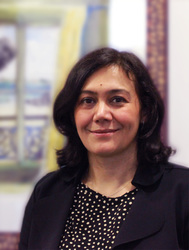Dr. Shirin Naef
Institut für Sozialanthropologie und Empirische Kulturwissenschaft, Universität Zürich
Curriculum Vitae
Dr. Shirin Naef ist Anthropologin und arbeitet hauptsächlich im interdisziplinären Bereich zwischen Recht, Religion und Ethik, mit besonderem Fokus auf den persischsprachigen Kulturraum. Sie studierte Theater und Englische Sprache in Teheran und von 2002 bis 2008 Anthropologie, Islamwissenschaft und Linguistik an der Universität Bern, Schweiz. Von 2009 bis 2012 war sie DFG-Stipendiatin und Mitglied des Graduiertenkollegs Bioethik am Internationalen Zentrum für Ethik in den Wissenschaften (IZEW) der Universität Tübingen. Zusätzlich trat sie 2011 ein Fellowship an der School of Social Anthropology der Universität Manchester an und war 2015 als Gastforscherin an der Brocher Foundation in Genf tätig. 2017 wurde Shirin Naef mit ihrer Dissertation „Kinship, Law and Religion: An Anthropological Study of Assisted Reproductive Technologies in Iran“ an der Philosophischen Fakultät der Universität Zürich promoviert, wo sie aktuell als Assoziierte Wissenschaftlerin am Institut für Sozialanthropologie und Empirische Kulturwissenschaft (ISEK) tätig ist.
Dr. Naefs Forschungsschwerpunkte sind Schiitischer Islam und Jurisprudenz (fiqh), Bioethik, Theologie in vergleichender Perspektive, materielle Kultur sowie Wissenschaftsgeschichte. Darüber hinaus beschäftigt sich Dr. Naef mit der Reproduktionsmedizin, Verwandtschaft und Sexualität und forscht seit 2017 über die Themen Philanthropie, Gemeinnützigkeit, Moral und Ökonomie.
Von Oktober 2018 bis Juni 2019 war Dr. Shirin Naef Fellow am Käte Hamburger Kolleg „Recht als Kultur“.
Forschungsprojekt
"Economy, Law and Religion: A Study of Shia Philanthropy in Iran"
This research project seeks to explore traditions of philanthropy throughout Shia history, in both conceptual and institutional terms. It also traces the implications of these traditions in framing the laws and regulations regarding charitable and related economic, religious and socio-cultural activities in Iran. The main objective of the study is to contextualise and integrate how and why various Shia religious legal authorities belonging to different traditions and in both historical and contemporary periods discuss, understand and develop their arguments and reasoning about giving and philanthropic activities. Drawing on theoretical insights from anthropology, law, religious and Islamic studies, this study also examines socio-cultural, normative, legal and religious aspects that emerge from these debates.
During the fellowship at Käte Hamburger Center for Advanced Studies in Humanities “Law as Culture”, I will be focusing primarily on two areas: The first concerns the issue of khums, one of the important pillars of the Islamic economic system, particularly in the Shia Tradition. In addition to zakāt (religiously obligatory almsgiving in Islam), there is another decentralized and religious tax system known as khums (‘one-fifth’), a religious-legal principle of devoting the annual surplus of one’s income to an upright religious authority (marjaʿ-e taqlīd) in Shia law. Half of the khums is considered to be the share of the Imam (Shia spiritual and political leader), and the remaining half goes to needy sādāt (descendants of the Prophet through his daughter Fatima). As such, khums is one of the major financial sources of the Shia clerical establishment and its independent educational and charitable institutions. While looking at the relationship between law and economy from a comparative perspective, I will explore contemporary Shia debates and understandings of khums and its implications and challenges regarding the regulation and development of both the religious and state tax systems in the Iranian context. The second area is a continuation of my interest in Islamic Jurisprudence (fiqh), especially the Shia School and its relation to modern legal concepts, morality and governance. Shia law influences Iranian civil Law. Accordingly, through the prism of philanthropy in this study, I investigate how the interplay of religious and civil law affect the formulation of moral concepts and principles, legal regulations and socio-economic policy.
This research will form an important part of a planned monograph on varieties of religious philanthropy and their place in the material, cultural, legal and economic context of Iranian life and society.
Publikationen (Auswahl)
- Kinship, Law and Religion: An Anthropological Study of Assisted Reproductive Technologies in Iran. Tübingen: Francke Verlag, 2017.
- Bioethik im Iran, in: Ludwig Paul (Hrsg.): Handbuch der Iranistik, Band 2, Wiesbaden: Reichert Verlag 2017, S. 174-179.
- Legal Status, Moral Values and Cosmological Order: Embryo Politics in Iran, in: Ethnologie française 2017/167 (3), S. 459-470.
- The Iranian Embryo Donation Law and Surrogacy Regulations: The Intersection of Religion, Law and Ethics, in: Die Welt des Islams. International Journal for the Study of Modern Islam 2015/55 (3-4), S. 348-377.
- Modern Reproductive Technologies in the Light of Traditional Ontologies: An Anthropological Reflection on Assisted Reproduction in Iran, in: Robert Ranisch / Sebastian Schuol / Marcus Rockoff (Hrsg.): Selbstgestaltung des Menschen durch Biotechniken. Tübingen: Francke Verlag 2015, S. 157-171.
- Gestational Surrogacy in Iran: Uterine Kinship in Shia Thought and Practice, in: Marcia Inhorn and Soraya Tremayne (Hrsg.): Islam and Assisted Reproductive Technologies: Sunni and Shia Perspectives. New York/Oxford: Berghahn Books 2012, S. 157-193.
- Gestational Surrogacy in Iran, in: Medical Journal of Reproduction and Infertility 2008/9 (1), S. 50-64. (im Persischen)


